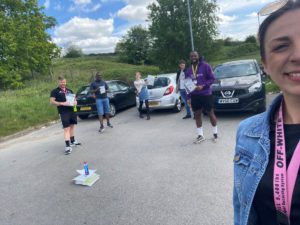
Dancing in the streets: an Asset-Based Community Development-informed Local Authority Response to COVID-19
Local Councils the world over face an important choice: do we treat people simply as consumers of mandated services or (while providing quality services) do we treat people as citizens?
Leeds City Council aims to treat people as citizens; they also consider the neighbourhood to be a vital unit of change. Over the last number of years Mick Ward, as a senior executive in the Council leadership team, has been hugely impactful in supporting the proliferation of an ABCD approach in Leeds. Nurture Development has had the privilege of support of Mick, the Council and partners towards those ends. But the last 12 weeks have tested us all. In this week’s blog, Mick reflects on the ups and downs of responding to COV-19 while endeavouring to stay true to ABCD principles.
Mick wrote this post days before he retired after 42 years of public service, he is now an associate of Nurture Development, where among other things he will be delivering training and consultancy support on strengths-based commissioning for further information please email info@nurturedevelopment.org
Cormac Russell
Dancing in the streets: an Asset-Based Community Development-informed Local Authority Response to COVID-19
For me, one of the most pleasing elements of Leeds City Council’s response to COVID 19 is how ABCD and the importance of neighbourliness was at the centre of it all from the start.
Across the Council, a huge range of work was initiated, covering major areas of Health and Social Care, economy, infrastructure and supplies, communications and, of course, citizen and communities. From the start of the crisis it was obvious that existing services would not be sufficient to meet the level of support required for those within the ‘shielded cohort’ and others who were self-isolating. To address this a working group on ‘Volunteering’ was established. This a partnership between the Third Sector, represented by Voluntary Action Leeds and Forum Central (the collective voice of the health and social care Third Sector in Leeds) and the council and is working with organisations who both changed their core ways of working to support people affected by Covid 19 and took on the role of coordinating volunteer support. We have identified thirty-three lead Third Sector organisations – one for each ward of the city.
What impressed me most was the leadership of the volunteering group: initially consisting of the Director of Adults and Health, a Chief Officer from the Communities Directorate and the Chief Executive of Voluntary Action Leeds. They quickly agreed that the volunteering effort would be broadly built around three ‘tiers’. These tiers were identified as:
Tier 1: Volunteers (with existing DBS checks in place) who could change where/how they were volunteering to provide the higher levels of support needed. This might include going into people’s houses or more complex support issues, such as picking up Methadone prescriptions.
Tier 2: The huge swathe of people who newly volunteered (this was prior and separate to the national call for ‘NHS Volunteers’). The aim was to match them up with individuals who had sought support to perform tasks such as going shopping, picking up generic prescriptions, dog walking etc.
Both of these calls had a huge response with over 8,000 volunteers but from the very beginning, we knew the most effective support would come locally – from neighbours and communities. A phrase summed up in one of the first COVID 19 blogs we did (see below) as ‘‘we don’t want Jane at number 24 registering to volunteer to then go through a process to then be matched to help out Mary at number 32.’ Therefore we established ‘Tier 3’ with working group focusing on this element, ensuring it had the same status and profile as the work on more formal volunteering.
Tier 3: Helping out your neighbours, popping a note through people’s doors or setting up a WhatsApp group, no need to formally register – just looking how neighbours can support each other.
Importantly, we also worked to understand the relationship between each of the three tiers, the Third Sector and indeed other statutory sector services. This is reflective of ABCD and asset based approaches, which acknowledges that while there may be a need for services you should start first with what a community can do itself. Understanding the links between these tiers has not only influenced how we respond to CV19, but is helping our longer term plans for ABCD and for the future commissioning of the Third Sector.
Of course, having a focus on ABCD and neighbourliness has to be backed with action and there are still challenges for a Local Authority in proliferating ABCD when it has to be citizen led. So we really focussed on promoting what was coming out from the existing dozen or so ABCD Community Builders in Leeds – how at a very local level Community Connectors were working to keep people connected and supported. We also actively sought out other examples of neighbourliness and citizen/community led activity taking place: from Physically Distant Street Dances to Communal Shopping, to Zoom coffee mornings, to Street Bingo and more. We’ve highlighted these stories through social media, newsletters and capturing the overall approach in a series of blogs under the heading Socially Connected Leeds. These blogs outline ABCD and asset based approaches in Leeds and were promoted extensively, including being part of the regular updates to all Councillors and local MPs from the Leader of Leeds City Council.
I believe this focus, with that support from senior council officers and the political leadership, was the result of a strong understanding of ABCD in Leeds, obtained not just from the work of Community Builders, but because increasingly ABCD and asset based approaches are our expected way of working. So at any opportunity there is thought given to ‘how to approach this from an asset based perspective’?
And so within Leeds, as we start to plan both the next phase of response to Covid 19 and the longer term, we are already looking at how we can further proliferate and invest in ABCD in the city. Not something that will be easy to do as the financial crisis grows larger, but the bigger question we are now asking is – can we afford not to?
Mick Ward
Chief Officer, Transformation and Innovation (Retired)
Adults and Health
Leeds City Council

Naomi Fletcher
I believe that many people who helped to organise/convene people in a local community would state in Leeds they did not get the same level of recognition and input for the work they have done and continue to do in the communities they live and operate in. In a recent consultation volunteers has to ask why their voice had not been included in a summary exercise – it had been overlooked. Hardly an inclusive approach.
The response to Covid was top down. DBS checks took in some cases 6 weeks or more to action (delayed response). Many people had DBS checks which were not used. No strategy about using these DBS checked people for future e.g. volunteering in schools.
ABCD is not used across all departments, still a lot of SILO working therefore waste of time and money. Little cross departmental working.